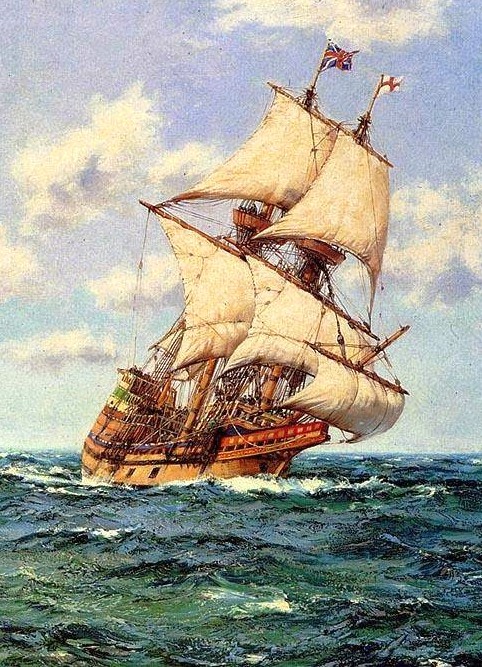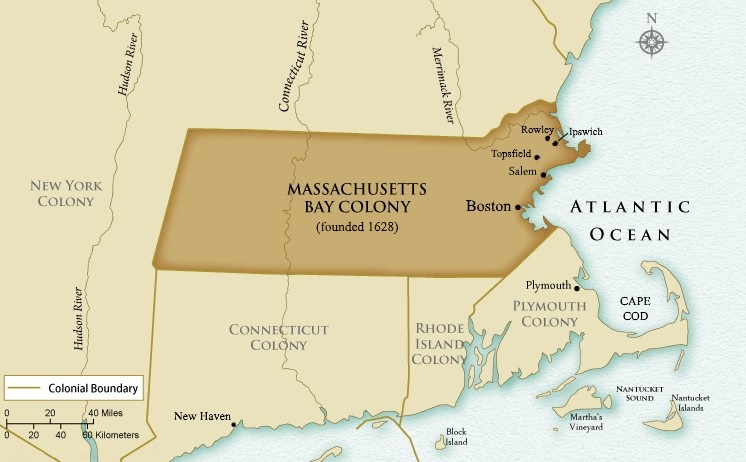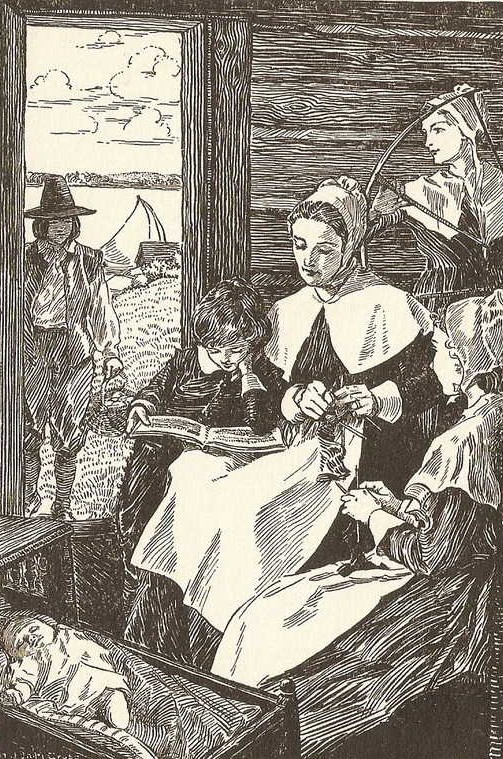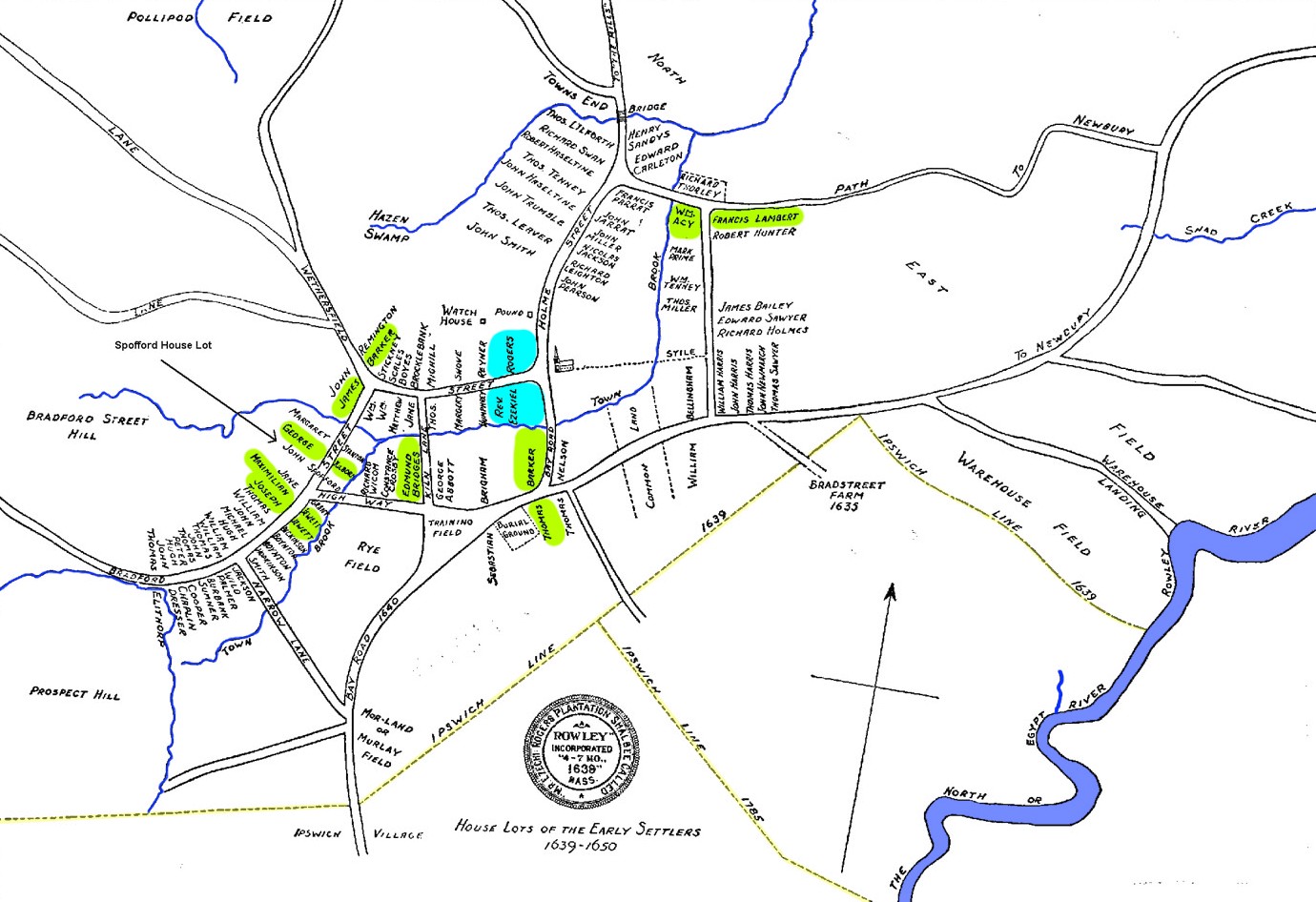 The Founding of Rowley, Massachusetts The Founding of Rowley, Massachusetts 
(version July 15, 2018)

The Harris and Weeks family trees have a few notable immigrant ancestors who were among the first settlers in 1639 to colonize Rowley, Massachusetts - one of the early Puritan settlements of the Massachusetts Bay Colony of New England. Though they arrived close to two decades after the Pilgrims landed 50 miles away at Plymouth Rock on the west shore of Cape Cod Bay, the Puritans who settled Rowley, like those at Plymouth, fled religious persecution in England to make new lives for themselves in the New World. The following history on the founding of Rowley is based partly on an 1839 address presented by Thomas Gage at the 200th anniversary celebration of the founding, and partly on research by eminent Essex County historian and genealogist George Blodgette, M.A. that he presents in a chapter on Rowley in History of Essex County, Massachusetts (1888). The quote below is from Blodgette (1888)
The town of Rowley, Massachusetts, was founded in 1639, by the Reverend Ezekiel Rogers and his company. The original grant, was from Ipswich on the south to Newbury on the north, and from the ocean on the east to the Merrimack River on the west.
Mr. Ezekiel Rogers was the son of the Rev. Richard Rogers, a distinguished Puritan, of Weathersfield, Essex county, England, was bred at Cambridge, where, in 1604, he was of Corpus Christi, when he was graduated as a Bachelor of Arts, and of Christ's College, in 1608, when graduated as Master of Arts.
After leaving the University he became chaplain in the family of Sir Francis Barrington, of Essex, exercising himself in ministerial duties for about a dozen years.
He then was called to a public charge, at Rowley, in Yorkshire, where he continued with great favor for about seventeen years, when he was compelled to relinquish his charge — as he tells the story in his will, "for refusing to read that accursed book* that allowed sports on God's holy Sabbath, or Lord's day, I was suspended, and, by it and other sad signs of the times, driven, with many of my hearers, into New England."
[*The "Book of Sports" (officially known as the "Declaration of Sports") was a proclamation issued in 1618 by King James I across all of England, and reissued in 1633 by Charles II. It listed several recreational acitivites that were permitted on Sundays and other holy days, allowing archery, and dancing, as well as various popular games played on May Day, but prohibiting bear- and bull-baiting. Charles' reign from 1625 to 1649 is also the era of the "Great Migration" of English settlers to the New World, largely in response to Charles' religious policies.]

Rogers with twenty or so Yorkshire families took passage on the ship John of London, and set sail in the summer of 1638 from the Old Harbour in the River Hull of Yorkshire. Their destination was Boston, capital of the Massachusetts Bay Colony of New England; and their captain was Master George Lamberton, an experienced mariner used to sailing the treacherous waters of the Atlantic. They carried with them a printing press, which went on to Harvard College to become the first press in the colonies. As their voyage was long, it was not until December of 1638 that they dropped anchor at Salem Harbor in Massachusetts, the John of London being but one of several ships ultimately organized by Rogers to bring families to the New World.
Captain Lamberton brought Rogers straight to Boston where he was introduced to Reverend John Davenport and a wealthy London merchant named Theophilus Eaton, who with Lamberton were starting a new settlement at a place then known as Quinnipiac, but later came to be called New Haven. John Winthrop, the governor of Massachusetts, referred to Roger's families as "Godly men, and most of them of good estate", which made them desireable settlers. As such, Davenport, Eaton and Lamberton tried to entice them to settle at Quinnipiac. Rogers was inclined at first to do so, but when things did not work out to his liking, he declined the offer. Some of his followers from other ships did indeed go on to New Haven, but, so far as we know, those he sailed with on the John of London decided to wait out the winter in Salem, and seek other opportunites when spring arrived. Still the defection of some of his company to New Haven affected him deeply, and he wrote in a letter to Governor Winthrop that he felt Lamberton had led caused him much grief.
Lamberton, who became estranged from Rogers over the affair, settled on one of the choicest lots in New Haven, and went on to help found other settlements in the colony. An interesting footnote is that a few years later he became captain of the first sea-going vessel to be built in New England. Called the "Great Shippe" by some it was chartered by "The Company of Merchants of New Haven" to set sail for England from New Haven in January of 1646 with a valuable cargo to make money for its investors. Sadly, when the "Great Shippe" sailed off into the winter mists with Lamberton at the helm, it was never seen nor heard from again, being immortalized 200 years later as the "Phantom Ship" in Longfellow's poem of the same name.
Our history continues below with a quote from Gage (1839).
Notwithstanding the many and great discouragements under which the first settlers of the Massachusetts colony labored, they were prosperously increased by great numbers of emigrants from England, who arrived from year to year. For several years, next after 1631, about twenty ships, with passengers, arrived each year. The number of inhabitants were so increased, they were forced to look out for new plantations every year; so that, within a few years, every desirable place, fit for a plantation on the sea-coast, was taken up. On the arrival of Mr. Ezekiel Rogers, with about twenty families, in December, 1638, the ... towns of Salem, Charlestown, Boston, Medford, Watertown, Roxbury, Lynn, and Dorchester, together with Cambridge, Ipswich, Newbury, Weymouth, Hingham, Concord, Dedham, and Braintree, were all occupied. They therefore spent the winter in Salem, improving the time in looking out a place for a plantation.
Mr. Rogers was a man of great note in England for his zeal, piety, and abilities. Mr. Eaton and Mr. Davenport exerted themselves, therefore, to persuade him and his company to proceed to New Haven, and settle with them. In consequence of these importunities, he made a partial engagement to comply, and sent on several of his company to examine the place, who, not finding every thing to their satisfaction, and he, feeling his responsibility to many persons of "quality in England, who depended on him to choose a fit place for them,"consulted with the ministers of Massachusetts. By their advice, he and his people concluded to take a place between Ipswich and Newbury; and these towns having granted some farms on this tract, Mr. Rogers's company purchased them at the price of £800. ... [He] then came with his people to this place, at first called "Mr. Rogers's plantation," afterwards Rowley; so called from Rowley, in Yorkshire, England, where he and some of his people had lived.
The precise time of their removal to Rowley is not known. It was probably as early as the last of April or first of May, 1639. [The town was built, and] the act of incorporation is in the following words. "The 4th Day of the 7th Month [September] 1639, Mr. [Ezekiel] Rogers' plantation shalbee called Rowley."
Mr. Rogers brought over from England with him, but about twenty families, as before stated. Before coming to Rowley, however, he had increased his company to about sixty families.

Rogers and his followers settled on land located in the northern part of the colony, about six miles northwest of Ipswich. Our history now returns to Blodgette (1888), with some added text shown that is enclosed in [brackets].
In the tract set off to Rogers' Company several farms had been laid out; these were purchased by the company for £800. The purchase money was contributed by such as were able to pay, and in the laying out of house lots, all who paid nothing were given one acre and one half, while those who paid were given lots in proportion to the amount they contributed. The distinction became more apparent when the rule of the assignment of rights—called "gates"—in the commons is known.
One and one-half acre house-lot was entitled to one and one-half gates.
A two acre lot to four and one-half gates.
A three acre lot to thirteen and one-half gates.
A four acre lot to twenty-two and one-half gates.
A six acre lot to forty-five gates.

[House lots were laid out along the brook runninng through town, which gave each family access to fresh water. Here they built their houses and, bringing spinning and weaving skills with them from their old homes in the East Riding of Yorkshire, they were among the first to establish a clothing industry in New England. They named their town Rowley, after the East Riding village in England from whence several of them came.]
The time of laying out the several house-lots is unknown. On the 10th of Eleventh Month, 1643, Mr. Thomas Nelson, Mr. Edward Carlton, Humphrey Reyner and Francis Parrat, appointed by the town for that purpose, made a survey of the town and registered the lots to all the inhabitants as granted and laid out. The names [of some] of the fifty-nine persons to whom house-lots were registered in this survey, together with a brief account of each, is here given,
[REVEREND EZEKIEL ROGERS, six acres straddling Wethersfield Street and just west of the church meeting house. Founding father and first minister of Rowley. Born in Wethersfield, England. Came with wife Joan in 1638, she died 1649. Second wife Elizabeth Wilson died in child birth in 1650. Married third wife Mary, the widow of Thomas Barker, in 1651. He died January 23, 1660-61, with no issue.]
WILLIAM ACY, two acres [on the path to Newbury]. Had wife Margaret and four children all brought with him 1639. His death is not of record. He made his will 22d of April, 1689, "being very aged;" it was proved 30th of September, 1690. (Essex Probate).
THOMAS BARKER, four acres [straddling Bay Road east of the Burial Ground]. Freeman, 13th of May, 1640. Had wife Mary, no children. He was buried 30th of Nov., 1650. His will was proved 25th of First Month, 1651. [Thomas Barker was called "Brother" in the will of Francis Lambert; and his wife, Mary, was called "Aunt" in the will of Gershom Lambert.]
JAMES BARKER, one acre and one-half [straddling Wethersfield Street]. [Probably the brother of Thomas Barker.] Freeman, 7th of October, 1640. Had eight children. Buried 7th of September, 1678. His will, dated 3d of Seventh Month, 1678, proved 24th of September, 1678, mentions himself as "born at Stragewell, in Low Suffolk, in old England." He also calls George Kilborn "brother." (Essex Probate).
EDMUND BRIDGES, one acre and one half [on the corner of High Way and Kiln Lane]. Was a blacksmith. Sold out and moved to Ipswich in 1644. Had wife Alice. One child born here.
MAXIMILIAN JEWETT, two acres [straddling Bradford Street]. Son of Edward and Mary (Taylor) Jewett, of Bradford, England. Baptized in Bradford, England, October 4, 1607. Freeman May 13, 1640; very early a deacon of the church. Had wife Ann and nine children. Died October 19, 1684. Will dated 17th of Eighth Month, 1684; proved 25th of Ninth Month, 1684. Is on file in office of Clerk of Courts, Salem, Vol. XLIII, page 46.
JOSEPH JEWETT, two acres [on the southwest side of Maximilian's lot]. Brother of Maximilian above and baptized in Bradford, England, December 31, 1609. Freeman May 22, 1639. Brought with him wife Mary Mallinson, whom he married in Bradford, England, October 1, 1634. Had nine children. Buried February 26, 1660-61. Will dated February 16, 1660; proved March 26, 1661, and on file in Essex probate.
GEORGE KILBOURNE, one acre and one half [straddling Bradford Street]. Freeman May 13, 1640. He was a son of Thomas and baptized at Wood Ditton, County Cambridge, England, February 12, 1612. Had wife Elizabeth and six children. Died October 14, 1685.
FRANCIS LAMBERT, two acres [on the path to Newbury]. Freeman May 13, 1640. Had wife Jane and six children. Buried September 23, 1647. Will dated September 20, 1647; proved 28th of First Month, 1648. Descendants in male line now living here.
Before 1660 other families appear of record as residents — some had come with Mr. Rogers as minors, others to work about the mills. Few of them were given rights in the commonage. The following are [some of] the new comers who appear to have actually resided here before 1660. [Some received plots of land several miles west of town along the Merrimack River.]
CHARLES BROWNE, [arrived] 1647, [67 acres a few miles northwest of town]; had wife, Mary, daughter of William Acy, and nine children. Buried December 16, 1687. [Some of his descendants moved to Kings Town, Rhode Island.] Will recorded with Essex Deeds, 5 Ipswich, 303.

Rowley house lots in 1643 (modified from Blodgette and Jewett, 1933)

REFERENCES:
Anonymous (1851), "Rev. Ezekiel Rogers" in Memoir of Rev. Nathaniel Rogers' Family. New England Historic and Genealogical Register, v. 5, p. 119-128. Blodgette, George (1888), "Chapter XCI: Rowley" in History of Essex County, Massachusetts (edited by D. Hamilton Hurd). Published by J.W. Lewis & Co., Philadelphia, v. II, p. 1128-1133. Blodgette, George and Jewett, Amos Everett (1933), Early Settlers of Rowley, Massachusetts. Published by Amos Everett Jewett, Rowley, Massachusetts. Gage, Thomas (1839), The History of Rowley. Published by Ferdinand Andres, Boston, 483 p. There is also an indexed digital version available online at the Gordon College Faculty website. Last accessed 15 July 2018. Isaac's Story (2013), "The Story of George Lamberton and the Phantom Ship". Online article at Scrapbook Your Family Tree. Last accessed 15 July 2018.
|

 The Founding of Rowley, Massachusetts
The Founding of Rowley, Massachusetts 



